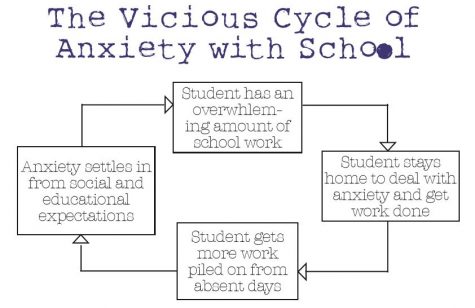Anxiety: A Personal Story
Freshman finds support in others while living with anxiety
As Allie’s mom combed through her hair in the morning, Allie was anything but excited to go to school. A tear rolled down her left cheek as she quietly begged her mom to let her stay home. School was not a bright place. It caused unprecedented amounts of stress and anxiety. Until third grade, Allie never really understood why.
When most third graders look in the mirror on picture day, they see a fresh face smiling back. However, if Allie caught a glance of her own reflection on that morning, she would see a puffy, red eyes and frown lines. Crying in the morning wasn’t unusual for her because even the thought of going to school agitated her nerves.
“I remember that day. I physically made myself sick in the morning so I wouldn’t go to school. I was just so scared to go, but I had to anyway. I was in the bathroom the whole day just waiting to throw up. At the end of the day when the bell rang, I finally did,” freshman *Allie Morris said.
After talking to a therapist about her internal thoughts, family life, and social dispositions, Morris was diagnosed with anxiety in third grade. She also learned that she had ADHD, ADD, and a learning disability. This made her childhood, and her current life, vastly different than those around her.
“I don’t like being with other people. I would rather do my own thing. When I’m with crowds I get more anxious. Even people tapping on their desk in class gets me worked up,” Morris said.
Though Morris has sought ways to deal with these unique challenges, worrying is a constant force in her life. She distresses about finishing homework assignments, gets unsettled at football games, and has trouble sleeping due to all the thoughts swarming in her head.

Morris is often flooded with feelings of isolation and loneliness when considering the state of her diagnoses. With such a unique combination of disorders, it’s easy for Morris to feel like she’s the only one dealing with a situation like her own.
“I get really angry about that. I feel like I’m the only person who has this situation, even though I know it’s not true. Sometimes I think, why do I have to be like this? Why can’t I change and be normal?” Morris said.
Morris still faces common bursts of unsettling emotion, but she’s developed methods to move past feelings of anxiety. When Morris first began seeing a therapist, she was skeptical about going to the sessions. In retrospect, she realized that she learned many useful ways to deal with internal challenges.
Morris uses a journal to clear out her feelings, listens to music to tune everything out, and practices breathing exercises to calm down in high stress situations. She also enjoys watching movies, listening to country music and Green Day, and spending time with her close friends. The most effective coping mechanism for Morris is simply talking.
“I have to talk a lot. I have to vent. I don’t like to bottle things up. If I keep bottling things up, I know I’ll just pop. I need to let it out,” Morris said.
When she needs to let something out, Morris’ family is always instrumental in supporting her. Morris inherited some of her disorders from her dad, so she feels a unique connection with him as he can understand what she’s feeling. Morris’ mom has also dealt with depression and anxiety in the past.
“She is learning to cope, but as a parent, it’s hard to see. She gets frustrated and wants to be normal like everybody else. There really is not a normal in life. You’re given a certain lot in life and you have to deal,” Morris’ mom said.
Morris’ parents work with her to develop coping strategies, hoping to teach her skills that she can use to work through her whole life.
“My mom helps me with everything. We’re so close, just genuinely always really close. I can always talk to her, or cry with her, and she’s always here when I need her,” Morris said.
Maintaining close relationships, like those with her parents, mobilizes Morris to build strong connections. Morris has even found ways to help one of her close friends deal with anxiety. When her friend is on the verge of having a panic attack, Morris acts as an outlet for her friend to reach out to. Both of them understand each other when dealing with anixousness.
“I think having anxiety has made [Allie] a lot more compassionate. Because she has a really high IQ but she still has to struggle with everything, she hones into people who are different,” Morris’ mom said.
Allie’s compassion and connection with others has given way to the strongest form of coping with anxiety. She’s learned that reaching out to others isn’t a burden, but rather, a strength.
“You need someone. Even if it’s a teacher or a counselor, you just need someone to talk to. Write a journal, write a diary. You can’t bottle things up. Don’t hide it. It’s always good to have someone look out for you,” Morris said.
The third grader who was once terrified of simply going to school has now found ways to live and thrive amongst her struggles. Through extreme hard work and firm strength, Morris finds solace in doing the things she loves with the people she loves. Mental disorders are scary, but as Morris has learned, she doesn’t have to face them alone.
*Name has been changed.
What to do if you are dealing with anxiety:
Tell Someone
The first step in dealing with an Anxiety Disorder is telling a trusted friend, family member, teacher, or counselor. Reaching out to someone can be relieving and provide support for feelings of anxiety. Contact your counselor or the school psychologists, Terrin Dorathy or Kelly O’Toole.
Medical Treatment
Medical treatment of anxiety is generally a safe and effective solution and is often used in conjuction with therapy. Different types of drugs work better for certain individuals.


